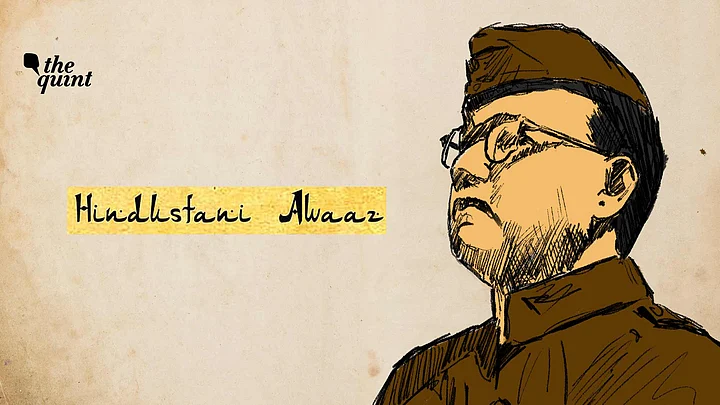‘Tum mujhe khoon do, main tumhe azaadi doonga’ (Give me blood, and I shall give you freedom) – with this slogan, Subhas Chandra Bose seized the popular imagination like few other leaders of his time. Popularly known as ‘Netaji’, this dashing, well-dressed figure, whose daring exploits, both on and off the political stage, made him a strikingly different person from the relatively staid political leaders of his time. Always immaculately dressed, fond of fast cars, unafraid of going against the grain and speaking of an armed struggle in which women were equal participants, he had little time for discussions and political parleys.
Naturally, he soon caught the eye of the Urdu poets of his age who were as much public intellectuals, polemicists and politically savvy as verse smiths. We find a fair amount of poetry written about him, the hopes and expectations from his leadership and the grief and bewilderment when he disappeared from sight at the peak of his political career.
'For Babu Subhas Chandra Bose'
Razi Badayuni (1878-1939) from the medieval city of Badayun, which has produced many a poet, wrote a panegyric entitled ‘Baabu Subhas Chandra Bose ke Naam’ (for Babu Subhas Chandra Bose), extolling his exemplary bravery and courage, pleading with the Almighty to give him a long life so he may continue to do his extraordinary work, ending with this heartfelt wish:
Azad Hind fauj ke aali commander
Baabu Subhas Bose pe Bharat ko naaz hai
Azadi-e-watan ke mujahid Khuda kare
Allah tujh ko ġhaib se taaqat ata kare
(O Great Commander of the Azad Hind army
Bharat is proud of Baabu Subhas Bose
May this fighter for the country’s freedom
Be granted courage from the Beyond by Allah)
Netaji's Willing Embrace of 'Be-Watani'
Tirlok Chand Mahroom, possibly the most prolific poet of his age who picked the smallest tremor in the political seismograph, was quick to take note of a giant-slayer such as Netaji. He, too, dwells on Bose’s courage and strength, his willing embrace of be-watani (homelessness) for the sake of his homeland, and offers reasons why he made such an impact on the popular Indian imagination:
Kiya muztarab teri ghairat ne mujh ko
Na dekhi gayi tujh se zillat watan ki
(Your self-respect has profoundly affected me
You couldn’t bear to see the nation dishonoured)
In a similar vein, Darshan Singh Duggal speaks of the legacy of honour and self-respect Bose has bequeathed his countrywomen and men, a legacy he traces to Rana Pratap and Tipu Sultan:
Woh aashiq watan ka, woh dharti ka shaida
Woh Rana ka saani, woh Tipu ka paikar
Tashhaddud ke aagey bhala sir jukata?
(That lover of the nation, that mad devotee of the soil
A match for Rana, made in the likeness of Tipu
Would he have bowed his head before aggression?)
And goes on to end thus:
Watan ki hawaon ka azaad naghma
Zameen ka tarana sunata rahega
(A free song wafting in the nation’s winds
He will keep humming the anthem of the soil)
At Bahadur Shah Zafar's Grave
In 1943, Bose visited the grave of Bahadurshah Zafar, the last Mughal emperor, in Rangoon. Here, he gave his famous rallying cry of ‘Dilli Chalo’, echoing the slogan of the mutineers of 1857 who had converged upon Delhi and made it a Markaz, a centre, of their revolt, just as they had hoisted the old and frail emperor on the throne of Delhi.
Bose’s Indian National Army held a parade near Zafar’s burial spot, with Bose describing Zafar as “the man under whose sacred flag freedom-loving Hindus, Muslims and Sikhs fought side by side”. This moment is described in a long poem entitled ‘Subhas Chandra Bose Bahadur Shah Zafar ke Mazaar Par’ (Subhas Chandra Bose at Bahadur Shah Zafar’s grave) by Jagan Nath Azad.
Written in the first person, from Netaji’s perspective:
Aaj pahli baar teri qabr par aaya huun main
Be-nava huun nazr ko be-laus dil laaya huun main
Gardish-e-taqdir ke hathon watan se duur huun
Eik bulbul huun magar sehn-e-chaman se duur huun
(I have come to your grave for the first time
I am indigent, all I have as an offering is my unbiased heart
Misfortunes have caused me to be away from my homeland
But I am the nightingale from the distant courtyard.)
Going on to establish a bond with the last emperor who, like him, was ‘watan se duur’ (‘far away from the homeland’), he remembers the mutineers from Meerut, the valour of the Rani of Jhansi, and vows to bring back Zafar’s lost honour with the ‘Tegh-i Hindi’, the sword he has unsheathed:
Teġh-e-Hindi jis ka loha manta hai ik jahan
Jis ki tezi ki gavahi de raha hai asman
(The sword of Hind whose mettle is recognised by all
Whose swiftness is borne witness by the skies)
A Bright Star
As new facts emerge about Bose, he continues to be re-evaluated and re-imagined. A modern-day poet, Saeed Arfi, wrote a nazm entitled ‘Woh Eik Sitara’ on Netaji’s centenary celebrations, describing Bose as a bright star that descended upon the earth to dispel the darkness of an enslaved nation, who shook Indians out of their lassitude, who lit the dark corners of our hearts with his rousing words, who wove dreams of courage and greatness for his people:
Woh zehn ki
Wusaton mein
is ummid ke saath
azaem ke biij bota raha
ki
aane vaali nasl
us fasl ko
kamyabi aur kamrani se kaat sakey
(In the vast expanses
Of the mind
He planted the seeds
Of greatness
In the hope
That the coming generations
Would be able to harvest it
Successfully and profitably)
(Dr Rakhshanda Jalil is a writer, translator and literary historian. She writes on literature, culture and society. She runs Hindustani Awaaz, an organisation devoted to the popularisation of Urdu literature. She tweets at @RakhshandaJalil. This is an opinion piece and the views expressed above are the author’s own. The Quint neither endorses nor is responsible for the same.)
